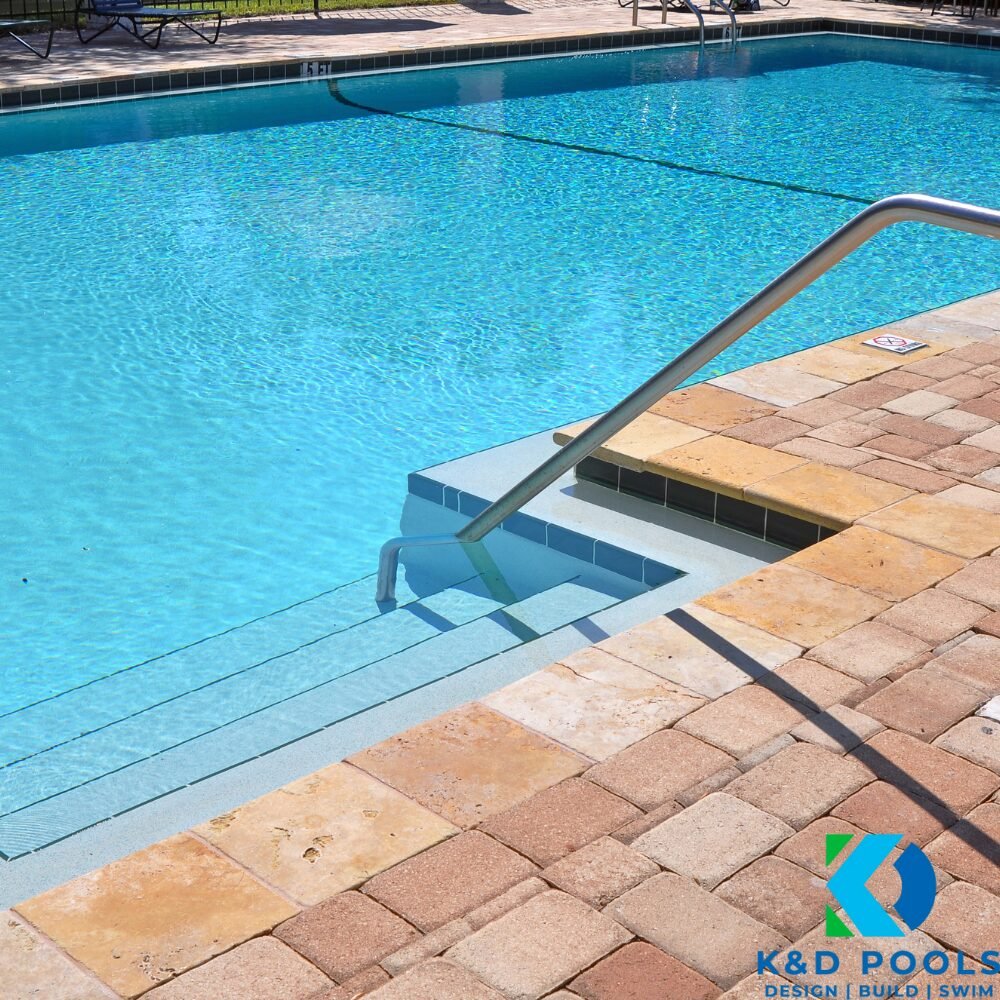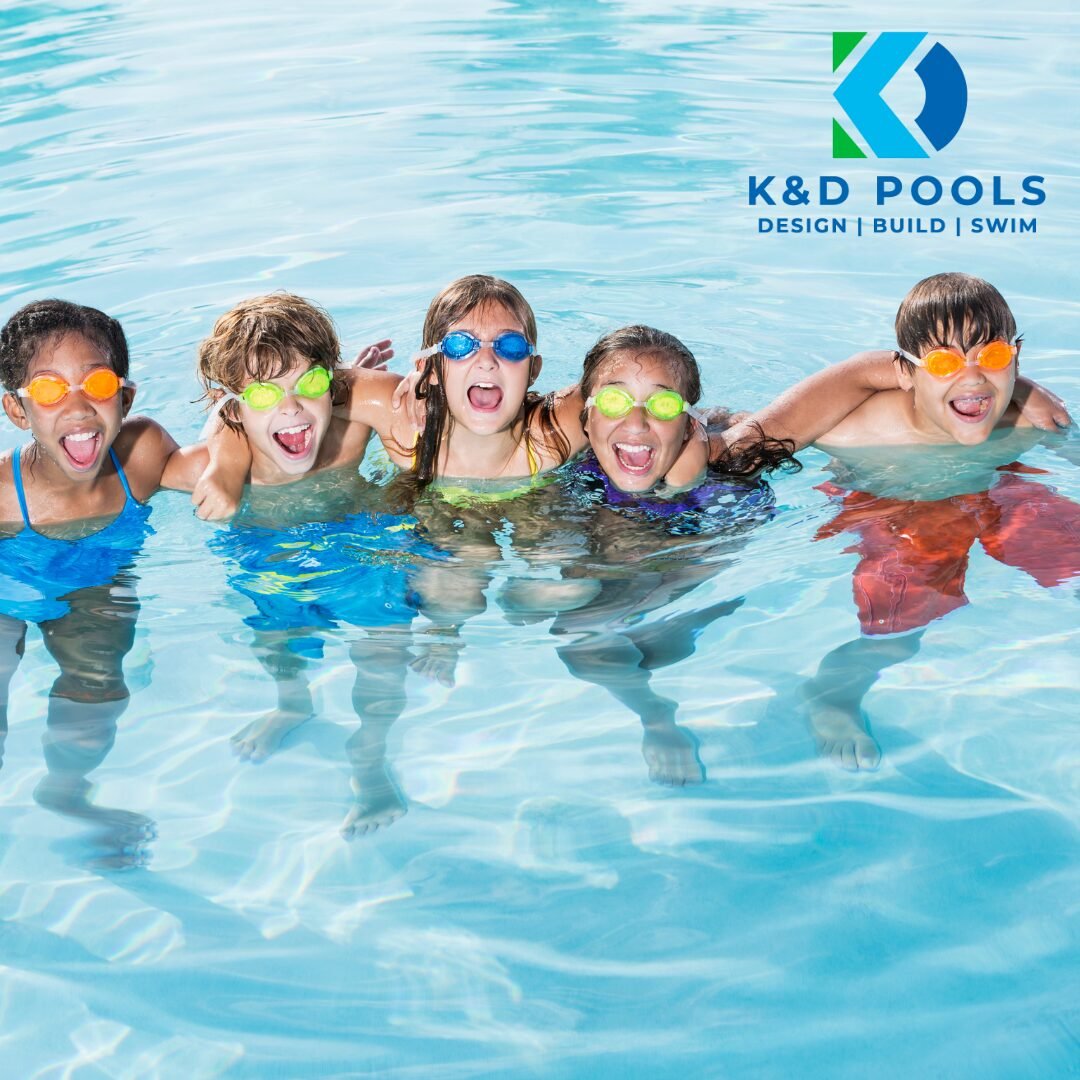Saltwater vs. Chlorine Pools: Which is Right for Your Backyard Pool?
A backyard pool is a big investment, and choosing between a saltwater or chlorine pool can make a significant difference in cost, maintenance, and swimming experience. As leading Fredericksburg pool builders, we help homeowners in Northern Virginia find the best solutions for their needs. Whether you’re looking for a custom pool with low maintenance or prefer the traditional route, this guide will break down everything you need to know.
How Do Saltwater and Chlorine Pools Work?
Understanding the differences between saltwater and chlorine pools begins with knowing how each system functions. While both aim to sanitize pool water effectively, they operate in distinct ways that impact maintenance, swimmer comfort, and long-term costs.
How Saltwater Pools Work
Saltwater pools are often misunderstood as being “chlorine-free,” but this is not the case. Instead, they generate their own chlorine using a device called a salt chlorine generator (SCG). Here’s how it works:
- Salt Dissolution: Pool owners add pool-grade salt (sodium chloride) directly to the water. Unlike ocean water, this concentration is relatively low—typically around 3,000 to 3,500 parts per million (ppm), which is about one-tenth the salinity of seawater.
- Electrolysis Process: The salt chlorine generator, which is installed in the pool’s plumbing system, uses an electric current to break down the salt molecules. This process, known as electrolysis, produces hypochlorous acid (HOCl) and sodium hypochlorite (NaOCl)—the same sanitizing agents found in traditional chlorine pools.
- Continuous Chlorine Production: Unlike traditional pools where chlorine is added manually, saltwater pools continuously produce chlorine as water flows through the generator. This provides a steady, low level of chlorine, reducing large chemical fluctuations.
- Sanitization: The newly generated chlorine disinfects the pool, breaking down bacteria, algae, and organic contaminants. Over time, the chlorine reverts back into salt, and the process repeats, reducing the need for frequent chlorine additions.
- Filtration & Circulation: A pool filter and pump work alongside the salt system to remove debris and maintain water clarity. Regular pool chemistry checks ensure the pH, alkalinity, and salt levels remain balanced.
Key Benefits of This Process
- Lower chlorine exposure: Since chlorine is generated gradually, it doesn’t result in harsh spikes or strong chemical odors.
- Less frequent chemical handling: No need to manually add chlorine as often.
- Softer water feel: Swimmers often report that saltwater pools feel gentler on the skin and eyes.
Challenges of Saltwater Systems
- Generator upkeep: The SCG cell requires occasional cleaning and replacement every 3-7 years.
- Salt corrosion: Saltwater can accelerate wear on certain pool components, such as ladders, lights, and heaters, if they are not salt-resistant.
How Chlorine Pools Work
Traditional chlorine pools rely on direct chemical additions to keep water sanitized. Unlike saltwater pools, chlorine is not produced continuously but instead must be added manually or through an automatic feeder. The chlorine’s primary function is to kill bacteria, algae, and organic debris, preventing cloudy or contaminated water.
Here’s how a chlorine pool operates:
- Chlorine Addition: Pool owners add chlorine tablets, liquid chlorine, or granular chlorine to maintain sanitation levels. These products introduce free chlorine (FC) into the water, which actively works to eliminate bacteria and other contaminants.
- Chlorine Dissolution & Disinfection: When chlorine is added, it forms hypochlorous acid (HOCl) in the water, which is the active agent responsible for killing germs and breaking down organic matter like body oils, sunscreen, and dirt.
- Maintaining the Right Chlorine Levels: Chlorine naturally depletes over time due to UV rays from sunlight, swimmer load, and organic material. To maintain proper sanitization, homeowners must regularly monitor and adjust chlorine levels to stay within the recommended range of 1-3 ppm.
- pH and Chemical Balance: Chlorine pools require constant balancing of pH (7.2-7.6), alkalinity (80-120 ppm), and cyanuric acid (CYA), which helps stabilize chlorine against UV breakdown. Without proper balance, water can become cloudy, algae can grow, or swimmers may experience irritation.
- Shock Treatments: Unlike saltwater pools that generate chlorine gradually, chlorine pools require occasional shocking—adding a large dose of chlorine to break down contaminants and restore water clarity. This is especially important after heavy rainfall, high swimmer usage, or algae outbreaks.
- Filtration & Circulation: A chlorine pool’s pump and filter system removes debris and circulates chlorine evenly throughout the water. Pool owners must clean or replace filters regularly to maintain efficiency.
Key Benefits of This Process
- Lower initial cost: No need to install a salt chlorine generator.
- Highly effective sanitation: Chlorine is a powerful disinfectant that works quickly to eliminate contaminants.
- Easier repairs: Since no generator is involved, maintaining a chlorine pool is often simpler and cheaper.
Challenges of Chlorine Systems
- Frequent chemical additions: Pool owners must routinely buy and handle chlorine products.
- Higher chlorine exposure: Chlorine levels can fluctuate, leading to potential eye and skin irritation.
- Stronger chemical odors: Chlorine pools often have a noticeable “pool smell,” especially in enclosed areas.
Pros and Cons of Saltwater Pools
Saltwater pools have gained popularity, but they come with advantages and disadvantages.
Pros of Saltwater Pools
✅ Lower Maintenance: Saltwater pools require less frequent chemical adjustments since the salt system continuously generates chlorine.
✅ Gentler on Skin and Eyes: Lower chlorine levels reduce irritation, making it ideal for sensitive skin and young swimmers.
✅ Softer Water Feel: Many homeowners enjoy the softer, silkier feel of saltwater over traditional chlorine pools.
✅ Reduced Chemical Handling: Unlike traditional pools, you won’t need to store large amounts of chlorine.
Cons of Saltwater Pools
❌ Higher Upfront Costs: Installing a saltwater system costs more than a chlorine pool due to the salt chlorine generator.
❌ Corrosion Issues: Salt can be harsh on metal components, requiring special materials or coatings for durability.
❌ Complex Repairs: Salt chlorine generators can fail over time and require specialized repairs or replacements.
❌ Electricity Usage: The generator requires constant power, potentially increasing energy bills.
Pros and Cons of Chlorine Pools
Chlorine pools have been the standard for decades, offering their own benefits and challenges.
Pros of Chlorine Pools
✅ Lower Initial Cost: Chlorine pools have a lower setup cost than saltwater pools.
✅ Effective Sanitization: Traditional chlorine pools kill bacteria and algae efficiently, preventing cloudy or unsafe water.
✅ Easier Repairs: Unlike saltwater systems, chlorine pools don’t require complex technology, making repairs simpler.
✅ Less Corrosion: Chlorine doesn’t pose the same risks to pool equipment and structures as saltwater.
Cons of Chlorine Pools
❌ Regular Chemical Balancing: Maintaining proper chlorine levels requires frequent testing and adjustments.
❌ Irritation Potential: Higher chlorine levels can cause dry skin, red eyes, and strong chemical smells.
❌ Ongoing Chemical Costs: Over time, purchasing chlorine adds up, making maintenance more expensive than expected.
❌ Stronger Odor: Chlorine pools tend to have a noticeable chemical smell, which some swimmers find unpleasant.
Frequently Asked Questions About Saltwater and Chlorine Pools
1. Which Pool Type Requires Less Maintenance?
Saltwater pools generally require less maintenance because the salt chlorine generator continuously produces chlorine. However, both types of pools need regular monitoring to maintain water balance.
2. Is a Saltwater Pool Really “Chlorine-Free”?
No, saltwater pools still contain chlorine. The difference is that chlorine is produced naturally from salt rather than added manually. This results in lower chlorine levels and a more comfortable swimming experience.
3. Are Saltwater Pools More Expensive Than Chlorine Pools?
Initially, yes. Saltwater pools cost more to install due to the generator, but over time, they may save money by reducing the need for chemical purchases.
4. Can I Convert My Existing Pool to a Saltwater Pool?
Yes! Many homeowners choose to convert their existing backyard pool into a saltwater system. However, this requires installing a salt chlorine generator and ensuring your pool materials can withstand salt exposure.
5. Which Pool Type Is Better for Northern Virginia’s Climate?
In Fredericksburg, VA, and surrounding areas, both saltwater and chlorine pools are viable. Since Northern Virginia experiences hot summers, proper pool maintenance is crucial regardless of the type you choose.
How to Choose the Best Pool System for Your Home
When to Choose a Saltwater Pool:
- You prefer lower maintenance.
- You want a softer feel to the water.
- You want to reduce handling of chemicals.
- You are willing to pay more upfront for long-term savings.
When to Choose a Chlorine Pool:
- You prefer a lower initial investment.
- You don’t mind regular chemical balancing.
- You want easier equipment maintenance and repairs.
- You are okay with occasional strong chlorine odors.
Let Fredericksburg’s Trusted Pool Builders Help You Decide
Choosing between a saltwater or chlorine pool depends on your budget, maintenance preferences, and long-term goals. As leading Fredericksburg pool builders, we specialize in custom pools designed for your lifestyle.
Our team at KD Pools has helped countless homeowners in Northern Virginia build stunning backyard pools that enhance their outdoor living spaces. Whether you’re looking for a custom pool with saltwater technology or a classic chlorine pool, we’re here to guide you every step of the way.
Ready to Build Your Dream Pool? Contact KD Pools Today!
If you’re ready to invest in a high-quality backyard pool, let our expert team help. Contact us today for a free consultation and see why we’re the preferred Fredericksburg pool builders!
Comparing the Core Differences
| Feature | Saltwater Pools | Chlorine Pools |
| Chlorine Source | Generated from salt | Manually added tablets, liquid, or granules |
| Maintenance Frequency | Lower (self-regulated chlorine production) | Higher (regular chlorine additions) |
| Water Feel | Softer, less irritating | Can be harsher on skin and eyes |
| Chemical Handling | Minimal | Frequent purchases and handling |
| Odor | Mild or none | Stronger chemical smell |
| Initial Cost | Higher (salt generator installation) | Lower (no generator needed) |
| Ongoing Costs | Lower (less chemical purchases) | Higher (regular chlorine expenses) |
| Complexity of Repairs | More complex (salt cell maintenance) | Simpler (basic equipment) |
| Impact on Pool Equipment | Can cause corrosion if not managed | No salt-related corrosion issues |



